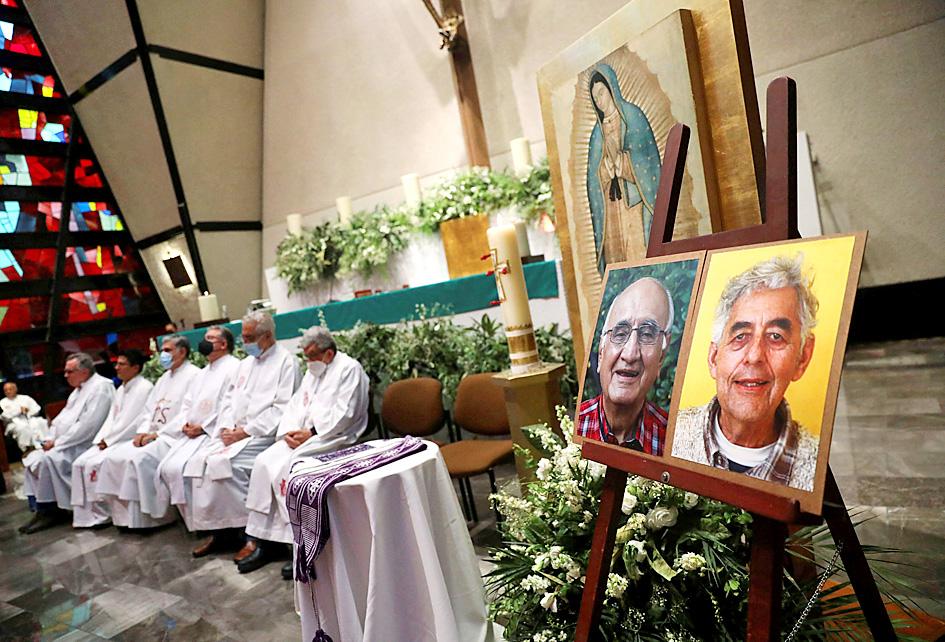Two elderly Jesuit priests were killed inside a church where a man pursued by gunmen apparently sought refuge in a remote mountainous area of northern Mexico, the religious order’s Mexican branch said on Tuesday.
Javier Campos, 79, and Joaquin Mora, 80, were on Monday slain inside the church in Cerocahui in Chihuahua state.
They were apparently killed after a man fleeing a drug gang took refuge in the church, authorities said.

Photo: Reuters
The gang apparently pursued and caught him, and killed all three.
Chihuahua Governor Maria Campos said a third man was killed, without identifying him, but Mexican President Andres Manuel Lopez Obrador said during his daily news briefing that the man fleeing the gunmen was also killed.
The state later identified the third man as a tourist guide, and said he had been kidnapped and taken to the church by the gunmen.
The governor said the killings caused “deep anger, indignation and pain” and “shook us to our deepest depths.”
Authorities have information about possible suspects in the killings, Lopez Obrador said, adding that the area has a strong organized crime presence.
Violence has plagued the Sierra Tarahumara for years. The rugged, pine-clad region is home to the indigenous group of the same name, and Cerocahui is near where Chihuahua meets Sonora and Sinaloa, a major drug-producing region.
A statement from the Roman Catholic Society of Jesus in Mexico demanded justice and the return of the men’s bodies.
“Acts like these are not isolated,” the statement said. “The Tarahumara mountains, like many other regions of the country, face conditions of violence and abandonment that have not been reversed. Every day men and women are arbitrarily deprived of life, as our murdered brothers were today.”

A string of rape and assault allegations against the son of Norway’s future queen have plunged the royal family into its “biggest scandal” ever, wrapping up an annus horribilis for the monarchy. The legal troubles surrounding Marius Borg Hoiby, the 27-year-old son born of a relationship before Norwegian Crown Princess Mette-Marit’s marriage to Norwegian Crown Prince Haakon, have dominated the Scandinavian country’s headlines since August. The tall strapping blond with a “bad boy” look — often photographed in tuxedos, slicked back hair, earrings and tattoos — was arrested in Oslo on Aug. 4 suspected of assaulting his girlfriend the previous night. A photograph

The US deployed a reconnaissance aircraft while Japan and the Philippines sent navy ships in a joint patrol in the disputed South China Sea yesterday, two days after the allied forces condemned actions by China Coast Guard vessels against Philippine patrol ships. The US Indo-Pacific Command said the joint patrol was conducted in the Philippines’ exclusive economic zone by allies and partners to “uphold the right to freedom of navigation and overflight “ and “other lawful uses of the sea and international airspace.” Those phrases are used by the US, Japan and the Philippines to oppose China’s increasingly aggressive actions in the

‘GOOD POLITICS’: He is a ‘pragmatic radical’ and has moderated his rhetoric since the height of his radicalism in 2014, a lecturer in contemporary Islam said Abu Mohammed al-Jolani is the leader of the Islamist alliance that spearheaded an offensive that rebels say brought down Syrian President Bashar al-Assad and ended five decades of Baath Party rule in Syria. Al-Jolani heads Hayat Tahrir al-Sham (HTS), which is rooted in Syria’s branch of al-Qaeda. He is a former extremist who adopted a more moderate posture in order to achieve his goals. Yesterday, as the rebels entered Damascus, he ordered all military forces in the capital not to approach public institutions. Last week, he said the objective of his offensive, which saw city after city fall from government control, was to

‘KAMPAI’: It is said that people in Japan began brewing rice about 2,000 years ago, with a third-century Chinese chronicle describing the Japanese as fond of alcohol Traditional Japanese knowledge and skills used in the production of sake and shochu distilled spirits were approved on Wednesday for addition to UNESCO’s Intangible Cultural Heritage list, a committee of the UN cultural body said It is believed people in the archipelago began brewing rice in a simple way about two millennia ago, with a third-century Chinese chronicle describing the Japanese as fond of alcohol. By about 1000 AD, the imperial palace had a department to supervise the manufacturing of sake and its use in rituals, the Japan Sake and Shochu Makers Association said. The multi-staged brewing techniques still used today are